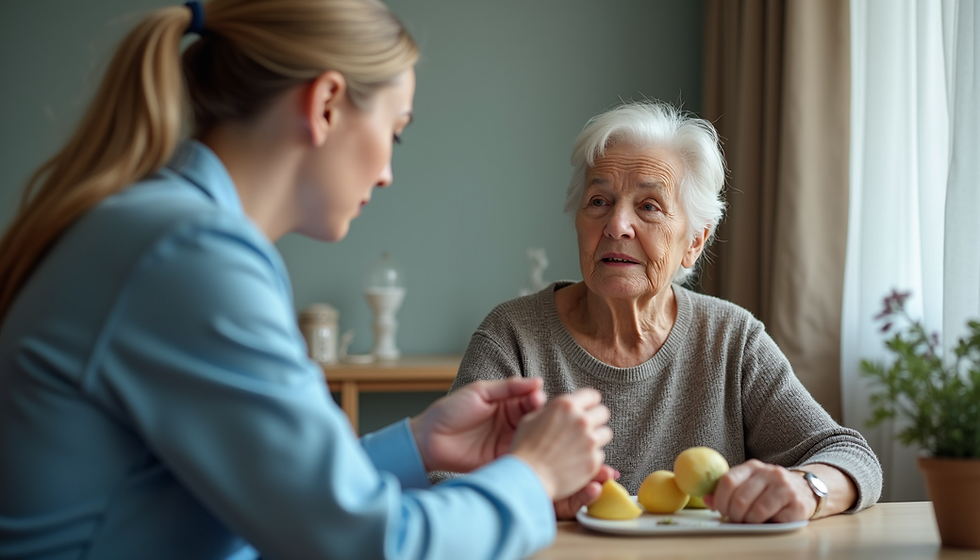The Ultimate Caregiver Checklist: Your Guide to Compassionate Care with APEX Professional Care
- Apex Professional Care

- Nov 18, 2024
- 3 min read

Creating a Caregiver Duty Checklist
A Caregiver Duty Checklist, also called a Home Health Aide duties list, is a document that lists all the things your loved one needs help with regularly. It's important to plan ahead for the tasks of caregiving so that each day goes smoothly for both the caregiver and the person receiving care.
What To Consider When Building A Caregiver Checklist?
Here are some important things to think about when making a caregiver checklist to help you deal with the challenges:
Learn about the person's health condition:
Talk to their doctors to understand their specific needs.
Read reliable sources like medical books or trusted websites for more information.
Ask about any special skills you might need to take care of them.
Explore different caregiving options:
Write down what the person needs for meals, laundry, bathing, etc.
Discuss these needs with the person, family, or healthcare providers.
See "How to Ask for Help" for guidance on this.
Plan for immediate care:
Ask the person what they want for their care and involve them in decisions.
Make changes to their living space if they need things like wheelchairs or walkers.
Figure out how to keep track of their health needs, like writing down what they eat or when they take medication.
Organize important information:
Write down the names and contact details of their doctors, their illnesses, and their medications.
Sort out their financial stuff like bills, bank accounts, and insurance.
Make copies of their social security numbers and insurance cards.
Plan for emergencies:
Have a plan in case something happens to the main caregiver.
Plan for the future:
Learn about the person's long-term health outlook to plan ahead.
Talk to a financial advisor who knows about caregiving costs.
Speak with a lawyer about legal documents like healthcare proxies.
Think about hiring a Certified Senior Advisor or geriatric care manager to help with family meetings and planning care.
When making your own checklist, be sure to include advice from the person's medical team. Use the following suggestions to make a list that fits your situation.
(Will make an illustration/Graphics) Personal Care
Bed bath, sponge bath, tub or shower bath
Comb hair
Brush teeth
Help with getting dressed
Additional Grooming as needed:
Wash hair
Shave
Nail care
Apply skin lotion
Medical Care
Check vital signs
Schedule medical appointments and physical exams
Remind to take medications
Pick up prescriptions
Check blood sugar and pressure
Heat sensitivity (prepare cooling scarves, washcloths, cold packs etc.)
Nutrition Needs
Prepare meals
Shop for groceries
Help with feeding
Encourage fluids/Restrict fluids
Shop for and remind to take vitamins
Organize pantry & fridge and ensure accessibility
Toileting
Assist with going to bathroom
Assist to bedpan/urinal
Incontinence Care
Empty urinary drainage/catheter bag
Empty colostomy bag
Incontinence (prepare underwear, feminine pads, absorbent sheets, extra clothes, towels etc.)
Mobility
Assist with walking (for ambulatory care recipients)
Turn position in bed (for bedridden care recipients)
Transfer/Bed/Chair (for wheelchair-bound care recipients)
Assist with home exercises and/or Physical Therapy exercises
Companionship
Take for a walk
Accompany to appointments
Coordinate community outings
Read aloud
Watch videos
Play games
Provide transport
Household/Support Services
Wash laundry
Clean kitchen
Take out the trash
Adjust room temperature
Clean bathroom
Clean bedroom
Check for oxygen on/off
Vacuum/dust living area
Make bed/change sheets
Pick up mail
Pay the bills
Monitoring
Keep an eye on and write down any changes that happen each day, like tiredness, feelings, and signs of being sensitive to heat. Then, adjust your plans based on what you notice.




Comments